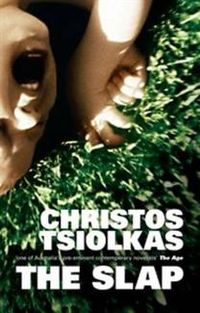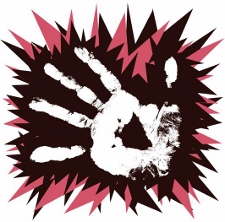The slap heard round the barbie
Author: Christos Tsiolkas
Most of us have been there at one time or another. The casual, relaxing get-together with friends that’s interrupted by the shrill misbehavior of someone’s child. As the children bicker the adults inwardly wince, either because the situation  is unpleasant or because the child belongs to them and they now have to broker the peace. In the normal course of things the parents glumly perform their duties and have an extra beer and the day shifts back into its pleasant rhythm. But what if it didn’t work that way? What if one of the parents, in the course of the brokering process, struck a child? Someone else’s child? In that case what you would have is Christos Tsiolkas’ The Slap.
is unpleasant or because the child belongs to them and they now have to broker the peace. In the normal course of things the parents glumly perform their duties and have an extra beer and the day shifts back into its pleasant rhythm. But what if it didn’t work that way? What if one of the parents, in the course of the brokering process, struck a child? Someone else’s child? In that case what you would have is Christos Tsiolkas’ The Slap.
The Slap is told via omniscient narrator through the eyes of several characters in turn. We begin with Hector, at whose home the incident takes place, and proceed through most of the major players, learning about their lives as well as how the incident resonates through their world. The slap is delivered by Hector’s cousin Harry to the son of Hector’s wife’s friend Rosie. Right there we have our first in a series of social disconnects that prompts the action to steamroll into ever greater consequences. Harry and Rosie are not friends – they are both at the party but are more like friends-in law. If it wasn’t for Hector and his wife Aisha, these two adults would have nothing to do with one another. That simple fact is what really sets the stage for all that is to come.
And all that is to come reveals much about the natures of everyone involved. As each character in turn is revealed by our relentless third person perspective we see strengths, weaknesses, misconceptions, bigotry, jealousy and selfishness within people who would, under normal circumstances, probably seem like perfectly reasonable excuses for human beings. Under the omniscient microscope they become petty and arrogant and cruel and stupid. Rarely do they become relatable as real flawed human beings – which becomes a big issue for the reader as the book wears on.
I have two main criticisms of The Slap. The first is outlined above and can be boiled down to Tsiolkas creating unlikable characters. Through the eyes of others they seem tolerable but when perspective switches to them, they are revealed as thoroughly unpleasant in so many ways that their good qualities get lost. Tsiolkas also has a tendency to be vulgar. All of the sex scenes in the book are crude and rough – no love is felt, no matter the situation. The sex, which is a strong motivating factor for some of the characters, is simply poorly written. He also writes his characters with broad gender stereotypes – none of them flattering. The women are petty, catty shrews and the men are arrogant, unfaithful cowards. Not until the final segment, which is written from the perspective of a teenage boy, does he really write a character for which we can fully root – someone whose good qualities outweigh his bad. It’s sad, really, because this young character proves that Tsiolkas can write a captivating, complex character that does not set the reader’s teeth on edge – he simply chose to make all the others hateful.
My final issue with The Slap is one that is no fault of the author. I struggled a little bit with the Australian slang. The characters are also a combination of Greek, Indian and Aussie, bringing in more unfamiliar verbiage. It isn’t a big deal, but it makes the read a little less fluid for those of us who speak American English only.
The Slap does have some merits and they occasionally outweigh the problems with the characterization and presentation. It’s an interesting premise. The reaction of all parties to the core dilemma – which side of this argument to support – is very interesting. Issues of family vs. old friends, past crimes vs. present crimes, parental rights and responsibilities and the complex nature of human social groups all form the subtext upon which the characters are painted. It’s a very interesting subtext, but one that is poorly served by harshly presented characters. Overall the book is just okay – 2 ½ stars and maybe worth your time on a rainy day when the power is out and there are no other books in the house.
May, 2014 Update!
The Slap is being made into a miniseries by NBC. No information on release dates but the book has already been made into a miniseries for Australian TV. The Aussie stars included Jonathan LaPaglia as Hector, Alex Dimitriades as Harry and Melissa George as Rosie. We’ll keep you updated with casting information for the US version. Who do you envision playing the major characters? Also, here is the logo for the upcoming miniseries. Cool.
— S. Millinocket
- Crossing the Pressure Line with Laura Bird - April 1, 2022
- Valentine’s Day Books for the maladjusted, unromantic, misanthrope. You know who you are. - February 12, 2013
- 6 Great Romance Novels - February 4, 2013

Leave A Comment